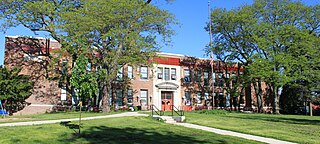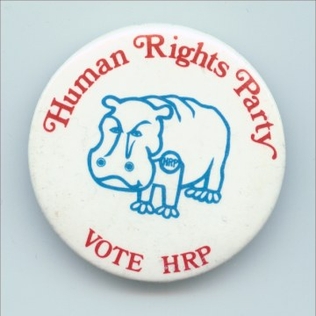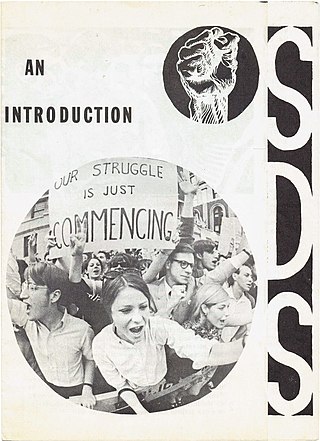Related Research Articles

Hugh Marston Hefner was an American magazine publisher. He was the founder and editor-in-chief of Playboy magazine, a publication with revealing photographs and articles.

Gay Liberation Front (GLF) was the name of several gay liberation groups, the first of which was formed in New York City in 1969, immediately after the Stonewall riots. Similar organizations also formed in the UK, Australia and Canada. The GLF provided a voice for the newly-out and newly radicalized gay community, and a meeting place for a number of activists who would go on to form other groups, such as the Gay Activists Alliance, Gay Youth New York, and Street Transvestite Action Revolutionaries (STAR) in the US. In the UK and Canada, activists also developed a platform for gay liberation and demonstrated for gay rights. Activists from both the US and UK groups would later go on to found or be active in groups including ACT UP, the Lesbian Avengers, Queer Nation, Sisters of Perpetual Indulgence, and Stonewall.

Community High School (CHS) is a public, magnet high school serving grades 9–12 in Ann Arbor, Michigan, in the United States. Located on a 3.2-acre (13,000 m2) site at 401 North Division Street near the city's Kerrytown district, CHS today enrolls approximately 450 students.

The black power movement or black liberation movement was a branch or counterculture within the civil rights movement of the United States, reacting against its more moderate, mainstream, or incremental tendencies and motivated by a desire for safety and self-sufficiency that was not available inside redlined African American neighborhoods. Black power activists founded black-owned bookstores, food cooperatives, farms, media, printing presses, schools, clinics and ambulance services.
Youth-led media is any effort created, planned, implemented, and reflected upon by young people in the form of media, including websites, newspapers, television shows and publications. Originating in the 20th century alongside youth activism, efforts have been highly influenced in the 21st century by the introduction of social media.

Ephebiphobia is the fear of youth. First coined as the "fear or loathing of teenagers", today the phenomenon is recognized as the "inaccurate, exaggerated and sensational characterization of young people" in a range of settings around the world. Studies of the fear of youth occur in sociology and youth studies. It is distinguished from pedophobia by being more focused on adolescents than prepubescent children.
Adultism is the abuse of the power that adults have over children. It has been defined as "the power adults have over children", "prejudice and accompanying systematic discrimination against young people", and "bias towards adults... and the social addiction to adults, including their ideas, activities, and attitudes". This phenomenon is said to affect families, schools, justice systems and the economy, in addition to other areas of society. Its impacts are largely regarded as negative, except in cases related to child protection and the overriding social contract. Increased study of adultism has recently occurred in the fields of education, psychology, civic engagement, higher education and further, with contributions from Europe, North America and South America.

The gay liberation movement was a social and political movement of the late 1960s through the mid-1980s in the Western world, that urged lesbians and gay men to engage in radical direct action, and to counter societal shame with gay pride. In the feminist spirit of the personal being political, the most basic form of activism was an emphasis on coming out to family, friends, and colleagues, and living life as an openly lesbian or gay person.

The Human Rights Party (HRP) was a left-wing political party that existed in Michigan from 1970 to 1977. The party achieved electoral success in Ann Arbor and Ypsilanti. It eventually expanded to include several other Michigan cities with large student populations. In 1975, the HRP became the Socialist Human Rights Party (SHRP), and it later merged with the Socialist Party of Michigan.
Youth Liberation of Ann Arbor was an organization based in Ann Arbor, Michigan. It existed from 1970 to 1979, and is often cited in more recent academic literature as one of the leading forerunners of several youth movements in the United States, including the youth rights movement, youth voice movement, and the youth media movement.
The Communist Party of Canada (Marxist-Leninist) (CPC-ML) fielded 71 candidates in the 2006 federal election. Some of these candidates have their own biography pages. Information about others may be found here.

Harry Haywood was an American political activist who was a leading figure in both the Communist Party of the United States (CPUSA) and the Communist Party of the Soviet Union (CPSU). His goal was to connect the political philosophy of the Communist Party with the issues of race.
The youth rights movement in the United States has long been concerned with civil rights and intergenerational equity. Tracing its roots to youth activism during the Great Depression in the 1930s, the youth rights movement has influenced the civil rights movement, opposition to the Vietnam War, and many other movements. Since the advent of the Internet, youth rights is gaining predominance again.
Sonia Yaco was the 1972 Human Rights Party candidate for the Ann Arbor, Michigan, school board. When she ran for office at the age of fifteen, she was the youngest documented candidate ever for a publicly elected school board seat in the United States.
Youth Communication is a New York City nonprofit youth media organization that promotes youth literacy and civic engagement through youth-led media.

The youth rights movement seeks to grant the rights to young people that are traditionally reserved for adults. This is closely akin to the notion of evolving capacities within the children's rights movement, but the youth rights movement differs from the children's rights movement in that the latter places emphasis on the welfare and protection of children through the actions and decisions of adults, while the youth rights movement seeks to grant youth the liberty to make their own decisions autonomously in the ways adults are permitted to, or to lower the legal minimum ages at which such rights are acquired, such as the age of majority and the voting age.

The Animal Liberation Front (ALF) is an international, leaderless, decentralized political and social resistance movement that advocates and engages in what it calls non-violent direct action in protest against incidents of animal cruelty. It originated in Britain in the 1970s from the Bands of Mercy. Participants state it is a modern-day Underground Railroad, removing animals from laboratories and farms, destroying facilities, arranging safe houses, veterinary care and operating sanctuaries where the animals subsequently live. Critics have labelled them as eco-terrorists.

The Black Panther Party was a Marxist–Leninist and black power political organization founded by college students Bobby Seale and Huey P. Newton in October 1966 in Oakland, California. The party was active in the United States between 1966 and 1982, with chapters in many major American cities, including San Francisco, New York City, Chicago, Los Angeles, Seattle, and Philadelphia. They were also active in many prisons and had international chapters in the United Kingdom and Algeria. Upon its inception, the party's core practice was its open carry patrols ("copwatching") designed to challenge the excessive force and misconduct of the Oakland Police Department. From 1969 onward, the party created social programs, including the Free Breakfast for Children Programs, education programs, and community health clinics. The Black Panther Party advocated for class struggle, claiming to represent the proletarian vanguard.

Students for a Democratic Society (SDS) was a national student activist organization in the United States during the 1960s and was one of the principal representations of the New Left. Disdaining permanent leaders, hierarchical relationships and parliamentary procedure, the founders conceived of the organization as a broad exercise in "participatory democracy". From its launch in 1960 it grew rapidly in the course of the tumultuous decade with over 300 campus chapters and 30,000 supporters recorded nationwide by its last national convention in 1969. The organization splintered at that convention amidst rivalry between factions seeking to impose national leadership and direction, and disputing "revolutionary" positions on, among other issues, the Vietnam War and Black Power.
References
- ↑ (nd) An Interview with Keith Hefner of Youth Communication Archived 2007-07-01 at the Wayback Machine . W. Clement and Jessie Stone Foundation. Retrieved May 8, 2007.
- ↑ Hefner, K. (1998) "The Movement for Youth Rights: 1945-2000 Archived 2007-03-20 at the Wayback Machine ," Social Policy. Spring 1998. Retrieved May 7, 2007.
- ↑ (nd) An Interview with Keith Hefner of Youth Communication Archived 2007-07-01 at the Wayback Machine .
- ↑ (nd) Youth Communications Staff. YouthComm.Org website. Retrieved May 8, 2007.